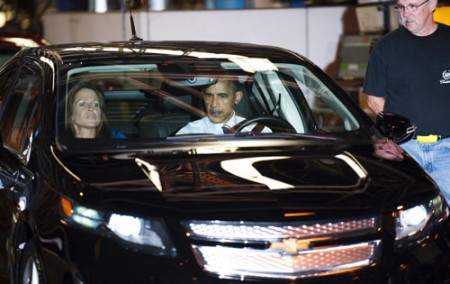
-Barack Obama, on the Chevrolet Volt
The President made this declaration just a few days before GM halted production of the Volt. It's simply not selling as well as anticipated. Dealers' inventories are backing up as production outstrips demand for Chevy's "plug-in hybrid electric vehicle" (PHEV).
Despite the $7,500 tax credit given to Volt buyers (Obama has proposed increasing that to $10,000), only 9,623 of the cars have been sold in North America through February 2012. 3,600 Volts are sitting around dealership lots, waiting like unwanted puppies to be adopted and taken to a good home. GM had once planned to produce 45,000 Volts in 2012. That is no longer their goal. (Source)
Why would you buy a Volt? To save money on gas? Even with the $7,500 tax credit it would take the average driver 9 to 12 years to save enough money on gas to recover the price difference between the Volt and the equivalent Chevy Cruze. 9 years with gas at $5/gallon, 12 years with gas at $4/gallon. (Source) And by then, the battery will have lost 20 to 30 percent of its range. (Source) A new battery costs $14,000. So by the time the Volt "pays for itself," it needs a new battery. And after three years, Kelly Blue Book predicts that used Volts will be worth about $17,000. (Source)
You'll need to buy a $14,000 battery to propel your car worth $17,000.
So you don't save money. Depending on where your house gets electricity from, you might not do much to help the environment (coal=electricity+pollution). And while you'll use less oil from the Middle East, you'll be buying a battery made from Chinese lithium and rare earth elements. You're trading dependency on one foreign market for dependency on another.
The only reason to buy a Volt is so you can call yourself a Volt driver. Which is fine. Plenty of people do that with Corvettes, Ferraris, Porches, BMWs, and so on. They like to make a statement with the vehicle they drive. Cars aren't just functional, they have style and personality. They're like clothes. So if people want to "wear" a Volt as a statement about themselves, good for them. All cars should make a statement. That's why we get to choose what color we want our cars to be.
Unfortunately, the actual people who NEED to save money at the pumps cannot afford a Volt. Not in the short-term with its high upfront cost, not in the long run with its depreciation and need to replace the battery. Right now the tax-credits are only helping the rich people who buy Volts as part of their automotive wardrobe.
And isn't the President against giving tax breaks to the wealthy?
Obama wanted 1 million PHEVs like the Volt on the roads of America by 2015. But common sense is against the Volt. It's a statement-vehicle for wealthy environmentalists, not a fuel-efficient people's car. And if you have to pay people $10,000 to buy a car, doesn't that speak volumes about the lack of demand for it?
PHEV technology is the future. It's not the present. That's why nobody is buying it, nor should they. The technology simply isn't good enough yet for Volts to be a successful consumer good.
The Volt is also an example as to why Government shouldn't guide an Economy. It's one thing to fund research into better battery technology with taxpayer money. It's another thing to hand $7,500 to someone because they want a Volt, or to give UAW-GM workers a job just because they make a Volt.
Instead of investing taxpayer money into encouraging people to buy a product they don't want, the Government should use that money to help the product develop into something that people would want. Spend some money to research military applications of electrically propelled vehicles (they'd be quieter, and you wouldn't need to constantly resupply them with oil-based fuels).
Consumers control markets. Not products. Not Governments. The idea of Government controlling the economy disturbs me. Government struggles to run itself, let alone the automotive industry. But Obama and his ilk think that they know better than the free market.
But they don't. Just look at the money-saving, environmentally friendly car they want us to buy. It's called the Volt and it doesn't save you money or help the environment.
No comments:
Post a Comment